Alumni
1945
Word has been received of the Jan. 25, 2015, death of Thomas C. Wickendon. After practicing anesthesiology for 25 years, Dr. Wickendon switched specialties to student health and worked with the Student Health Services at the University of Florida in Gainesville. He is survived by a daughter and two sons.
1947
James C. Monteith, a radiologist, died Dec. 9, 2017, at age 95. He served in the U.S. Navy during World War II, earning the American Campaign Medal and the World War II Victory Medal Honorable Service Button. He subsequently served in the U.S. Air Force before returning to civilian life to practice radiology at Westchester County Medical Center. Dr. Monteith relocated to Coral Gables, Fla., to become chief of radiation oncology at the Radiation Oncology Mercy Hospital in Miami. Preceded in death by a son, he is survived by his wife, Anita, a daughter, and a grandson.
Alexander C. Smith, a retired general medicine practitioner and obstetrician/gynecologist, died Dec. 3, 2017. He served in the U.S. Navy during World War II, commissioned as a lieutenant junior grade, based at the Chelsea Naval Hospital in Boston. Dr. Smith maintained an affiliation with the Frisbie Memorial Hospital in Rochester, N.H., for 45 years, proud of providing cradle-to-grave care for families in the greater Rochester area. With obstetrics a big part of his practice, he delivered more than 5,000 babies. Upon his retirement in 1997, he volunteered for a decade at the Avis Goodwin Clinic. He also played a central role in various public health efforts, including a drive to immunize local children against polio. A leading advocate for community-based mental health services, he was instrumental in the establishment of the Strafford Child Guidance Clinic. His honors included three Rochester Jaycee Citizen of the Year Awards, the State of New Hampshire Jaycee Outstanding Service Award, and the University of New Hampshire Granite State Award for Outstanding Public Service. Preceded in death by his wife, Edna, he is survived by six children and eight grandchildren.
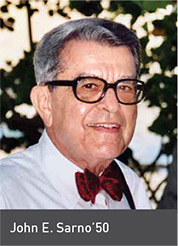 1950
1950
John E. Sarno, a distinguished academic physiatrist in the Department of Rehabilitation at New York University, died June 22, 2017, of cardiac failure, a day before his 94th birthday. Best known for a unique approach he developed to treat chronic pain, which he called “tension myositis syndrome,” he was the subject of a segment on the TV news magazine “20/20” and a recent documentary, “All the Rage (Saved by Sarno).” Dr. Sarno served in the U.S. Army, stationed in field hospitals in Europe during World War II. Upon receipt of his MD from Columbia he pursued a family practice in Fishkill, N.Y., founding the Mid-Hudson Medical Group. After returning to New York City to complete residencies in pediatrics at Columbia-Presbyterian and in rehabilitation medicine at the Institute for Physical Medicine and Rehabilitation at NYU, he joined the faculty of the Rusk Institute for Rehabilitation Medicine in 1965, where he spent the next four decades honing his skills and developing his controversial theory of the psychological origins of chronic pain. While discounted by many of his medical peers, his book, “Healing Back Pain: The Mind-Body Connection,” sold more than a million copies and found a large following. He was also the author of three other books, “The Mindbody Prescription: Healing the Body, Healing the Pain,” “The Divided Mind: The Epidemic of Mindbody Disorders,” and “Mind Over Back Pain.” Outside of medicine, his first love was music. As a student at VP&S he sang in the student glee club, The Bards, participating in an encore reunion performance in 1998. He is survived by his wife, Dr. Martha Lamarque Sarno, four children, four grandchildren, and a great-grandson.
1951
Virginia Kanick, retired clinical professor of radiology at VP&S, died Nov. 15, 2017. Longtime deputy director of radiology and senior attending at St. Luke’s-Roosevelt Hospital in New York, where she served a tenure as president of the hospital medical board, Dr. Kanick also officiated as president of the Physicians Relief Fund. She was particularly proud of her role in the development of angiography in the late ’50s and early ’60s. She served for a time on the Advisory Committee for Medical Devices at the Food and Drug Administration and as director of the New York State Radiology Society and the New York County Medical Society. Among her extra-medical passions was the study of archeology, history, and foreign cultures. She is survived by four nieces and nephews and their extended families.
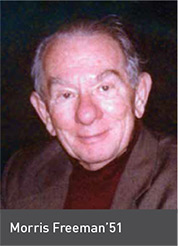 Morris Freeman died Oct. 5, 2017. Born in Chotin, Romania, he emigrated with his family to the United States and served in the U.S. Navy during World War II. A 1945 graduate of the Columbia dental school, Dr. Freeman practiced dentistry for several years before opting for a career in medicine. A revered medical oncologist and longtime member of the clinical faculty in the Department of Medicine at Albert Einstein College of Medicine and an attending at Montefiore Medical Center, he practiced for more than 45 years, mentoring many medical students along the way. Upon his retirement in 2000, he wrote that his greatest regret was “the need to retire from what I enjoyed the most.” Cognizant of the many astounding advances in medicine since he entered the field, he also remained committed to equal access. Dr. Freeman once wrote on an alumni questionnaire: “The miracles of high tech medicine, unknown in 1951, are unaffordable to most of our population. With the profit potential great, the insurance and investment moguls have moved in and taken over the ‘management’ of health care delivery. For-profit business management is incompatible with good health care delivery for all our people. Physicians have been disempowered and are mere pawns in this cold and impersonal big-business machine. Medical science is doing very well. Whatever happened to compassion, the ethics, the artof medicine?” Dr. Freeman’s wife, Violet, died in November 2017. He is survived by a daughter, a son, Neil J. Freeman’85, a daughter-in-law, Linda R. Aboody’85, and three grandchildren.
Morris Freeman died Oct. 5, 2017. Born in Chotin, Romania, he emigrated with his family to the United States and served in the U.S. Navy during World War II. A 1945 graduate of the Columbia dental school, Dr. Freeman practiced dentistry for several years before opting for a career in medicine. A revered medical oncologist and longtime member of the clinical faculty in the Department of Medicine at Albert Einstein College of Medicine and an attending at Montefiore Medical Center, he practiced for more than 45 years, mentoring many medical students along the way. Upon his retirement in 2000, he wrote that his greatest regret was “the need to retire from what I enjoyed the most.” Cognizant of the many astounding advances in medicine since he entered the field, he also remained committed to equal access. Dr. Freeman once wrote on an alumni questionnaire: “The miracles of high tech medicine, unknown in 1951, are unaffordable to most of our population. With the profit potential great, the insurance and investment moguls have moved in and taken over the ‘management’ of health care delivery. For-profit business management is incompatible with good health care delivery for all our people. Physicians have been disempowered and are mere pawns in this cold and impersonal big-business machine. Medical science is doing very well. Whatever happened to compassion, the ethics, the artof medicine?” Dr. Freeman’s wife, Violet, died in November 2017. He is survived by a daughter, a son, Neil J. Freeman’85, a daughter-in-law, Linda R. Aboody’85, and three grandchildren.
1952
Murray A. Greene, a retired cardiologist and member of the clinical faculty at Albert Einstein College of Medicine, died Oct. 1, 2017. Dr. Greene served as chief cardiologist at the Bronx-Lebanon Hospital Center, where he played a key role in establishing an intensive care unit. He is survived by his wife, Eileen.
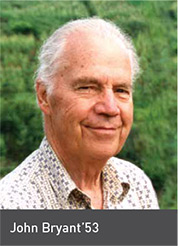 1953
1953
John Bryant, a past director of the Columbia University School of Public Health (now the Mailman School of Public Health) and key figure in international public health, died July 5, 2017. Dr. Bryant served as a U.S. Navy pilot during World War II. The author of “Health & the Developing World” (1969), a landmark assessment of the prodigious problems and vast inequities in health care delivery in the world’s less economically favored nations, Dr. Bryant characterized his approach to international health as “going around with a big empty basket…[with] no biases to get in the way and the will to learn.” He taught on the faculties of medicine at the University of Vermont and Ramathibodi Hospital Faculty of Medicine in Bangkok, Thailand, before returning to Columbia as the Joseph DeLamar Professor of Public Health, director of the School of Public Health, and associate dean of the Faculty of Medicine (Public Health). In 1978 he moved to Washington to serve as director of the Office of International Health and deputy assistant secretary for international health in the Department of Health and Human Services under President Jimmy Carter. In that capacity, he represented the U.S. government on the executive board of the World Health Organization and participated in a number of joint U.S.-WHO activities, including the development of the WHO Code on Infant Formulas. He also negotiated a treaty for collaborative research with the Chinese government and coordinated treaty interactions relating to health care with 22 other countries. Dr. Bryant served as a member of the U.S. delegation to the International Conference on Primary Health Care in Alma Ata, Kazakstan, then a part of the USSR. Alma Ata became a catchword for “health for all.” He subsequently served as the Noordin M. Thobani Professor and founding chair of the Department of Community Health Sciences at the Aga Khan University in Karachi, Pakistan, before returning to Vermont. He later lived in a retirement community in Charlottesville, Va. He held an honorary doctorate of science from the University of Arizona, his undergraduate alma mater. Survivors include his wife, Nancy, two daughters, a son, five grandchildren, and nine great-grandchildren.
Sylvia Davies Diehl, a physician committed to community, maternal, and child health, died Feb. 28, 2018, a month before her 90th birthday. Over the course of her career she worked as a physician with the Madison, N.J., schools, Morristown Medical Center, and Planned Parenthood of Northern New Jersey, which she served as medical director. Upon her retirement from practice, she volunteered for Meals on Wheels, Dress for Success, and other community-oriented programs. Preceded in death by her husband, Kenneth R. Diehl, Dr. Diehl is survived by two daughters, a son, and five grandchildren.
Herman L. Grossman, a retired pediatric radiologist, died Feb. 11, 2018. Dr. Grossman served as a lieutenant in the U.S. Navy during World War II. After the war he opened a private pediatric practice and made house calls before pursuing advanced study in pediatric radiology at Columbia. He was a founding member of the pediatrics radiology program at Duke University, where he held dual appointments as professor of pediatrics and professor of radiology, teaching until his retirement in 1997. Duke established a lectureship in his name. He is survived by his wife, Eunice, three daughters, and four grandchildren.
Horton A. Johnson, a distinguished academic pathologist, died of cardiac failure Dec. 24, 2017. He served in the U.S. Navy aboard the USS Atlanta during World War II. Following a time as a research scientist at Brookhaven National Laboratories, he taught on the faculty at Indiana University’s medical school and as professor and chair of pathology at Tulane University, rounding out his career as chief of pathology at St. Luke’s-Roosevelt Hospital in New York. Also knowledgeable in and passionate about art history, he volunteered upon his retirement as a tour guide at the Metropolitan Museum of Art. Preceded in death by a daughter, Dr. Johnson is survived by his wife, Caryl, four daughters, a son, two stepsons, 14 grandchildren, and two great-grandchildren.
1954
Sherwin V. Kevy, former associate professor of pediatrics at Harvard Medical School and medical director of transfusion services and blood bank at Children’s Hospital Boston, died Dec. 3, 2017. He was 89. He authored more than 50 scientific papers. His research focused on the development of the current blood and red cell preservation method, the introduction of machines for platelet apheresis, and the use of in vitro gamma globulin for treating patients with multiple recurring infections. He also played a key role in the field of regenerative medicine, employing growth factors in autologous platelet concentrates. Dr. Kevy is survived by his wife, Sandra, two sons, and two grandchildren.
1955
William Lovekin, a retired cardiologist, died Feb. 25, 2018, at age 87. Dr. Lovekin began his career as one of three general physicians at the Ganado Mission Hospital, serving the medical needs of the Navajo reservation in Ganado, Ariz. Later pursuing training in cardiology, Dr. Lovekin moved with his family to New Mexico, where he served as one of three faculty members in the new medical school at the University of New Mexico in Albuquerque. He subsequently opened his own private practice, Cardiology Associates, and later teamed up with others in a group practice that grew into the New Mexico Heart Institute. Preceded in death by his wife, Anne, he is survived by two daughters, two sons, six grandchildren, and six great-grandchildren.
Julian P. Smith, a retired obstetrician/gynecologist, died Nov. 1, 2017, at age 87. Dr. Smith served as a reserve commissioned officer in the U.S. Army, stationed in Germany. Upon being honorably discharged at the rank of captain, he completed a fellowship in ob/gyn at the University of Texas MD Anderson Medical Center, where he designed and conducted clinical trials demonstrating the effectiveness of applying multidisciplinary therapy to the treatment of ovarian cancer. As one of the founding members of the Department of Gynecological Oncology at Anderson, he became widely known for his contributions to the treatment of ovarian cancer and for his surgical techniques and teaching talents. Co-author of a textbook, “Gynecologic Oncology: Management of Complications,” he trained generations of postdoc fellows in the field. Over the course of his career he taught on the faculties of Wayne State University and Loyola University and served as chief of the Department of Gynecological Oncology at the University of Maryland. He was a founding member and past president of the Society of Gynecological Oncologists, president of the Society of Pelvic Surgeons, first president of the Felix Rutledge Society, and past president of the Mid-Atlantic Gynecological Oncology Society. Preceded in death by his wife, Eleanor, he is survived by two daughters, two sons, and eight grandchildren.
John B. Zabriskie, professor emeritus at Rockefeller University and a renowned researcher in infectious diseases, died Aug. 17, 2017. He was 88. A native of Montreux, Switzerland, Dr. Zabriskie served in the U.S. Air Force after graduating from VP&S. He joined the Rockefeller faculty in 1960, rising to tenured professor and head of the Laboratory of Clinical Microbiology and Immunology. He found that the antibodies produced by the immune system in response to streptococcal infection also reacted with cell membranes in the heart. His later medical research focused on heart cross-reactive antibodies resulting from strep throat and their migration to the brain, often resulting in serious medical consequences, including Sydenham chorea, obsessive-compulsive disorder, and Tourette’s syndrome. He is best known for his investigation of streptococcal infections and related secondary autoimmune disorders and his findings on the link between bacterial infections and obsessive-compulsive disorders in children. Also passionate about music, he studied cello for many years with Hiao-Tsien Ma, father of Yo-Yo Ma, and assisted the father in founding the Children’s Orchestra Society. He is survived by his wife, Paulette, a daughter, two sons, and six grandchildren.
1956
Raymond C. Bartlett, professor of laboratory medicine emeritus at the University of Connecticut and a former staff physician at Hartford Hospital, where he directed the residency program in pathology, died Jan. 23, 2018. Dr. Bartlett descended from a long line of VP&S alumni, including his great-grandfather, Philo Clark (1867 graduate), his grandfather, Raymond Clark (1895), a cousin, Raymond Barrett (1921), and an uncle, Robert Robinson (1938). The author of a book, “Medical Microbiology, Quality, Cost and Clinical Relevance,” that revolutionized the field, Dr. Bartlett was proud of his impact on the cost-effective practice of medical microbiology nationwide and his pioneering role in assuring quality control in medical microbiology. In his free time, he sang tenor in a church choir. He is survived by his wife, Esther, a daughter, two sons, and nine grandchildren.
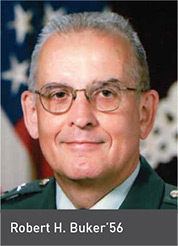 Robert H. Buker, a retired military cardiothoracic surgeon and former professor of surgery at the Uniformed Services University of Health Sciences in Bethesda, Md., died Sept. 25, 2017. The son of medical missionaries, Dr. Buker served his entire career in the U.S. Army, rising to the rank of two-star major general. He was honored with numerous medals and ribbons, notably the Distinguished Service Medal, Legion of Merit, Army Commendation Medal, and National Defense Service Medal. In retirement he volunteered at a free senior citizens clinic in Naples, Fla., and was an avid hunter and fisherman. Survivors include his wife, Ethel, a certified nurse midwife, two daughters, and a son.
Robert H. Buker, a retired military cardiothoracic surgeon and former professor of surgery at the Uniformed Services University of Health Sciences in Bethesda, Md., died Sept. 25, 2017. The son of medical missionaries, Dr. Buker served his entire career in the U.S. Army, rising to the rank of two-star major general. He was honored with numerous medals and ribbons, notably the Distinguished Service Medal, Legion of Merit, Army Commendation Medal, and National Defense Service Medal. In retirement he volunteered at a free senior citizens clinic in Naples, Fla., and was an avid hunter and fisherman. Survivors include his wife, Ethel, a certified nurse midwife, two daughters, and a son.
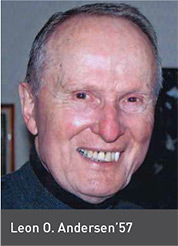 1957
1957
Leon O. Andersen, a retired internist/cardiologist formerly affiliated with Good Samaritan Hospital in Suffern, N.Y., died Feb. 14, 2018. Dr. Andersen served as a medical doctor and captain in the U.S. Air Force, stationed in Chateauroux, France, from 1959 to 1962. In an alumni questionnaire he bemoaned in the current practice of medicine “too much reliance on laboratory testing, often needlessly expensive,” insisting, true to his VP&S training, that “meticulous history taking and physical examination are still the cornerstones of good medicine.” After he moved to Lancaster, Pa., in retirement, he created the first countywide police automated external defibrillator program in the United States. The program placed these life-saving devices in every Lancaster county police car. Survivors include his wife, Edith, and two sons, Rolf Andersen’83 and William Andersen’87.
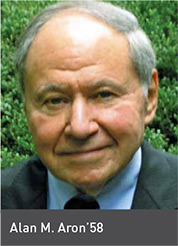 1958
1958
Alan M. Aron, a pediatric neurologist, died Dec. 26, 2017. Dr. Aron was director and professor emeritus of pediatric neurology at Mount Sinai School of Medicine in New York City. Co-author of some 40 peer-reviewed papers and as many abstracts, Dr. Aron pursued research in rational therapies for neurological disorders based on molecular biologic systems, among other areas of interest. He also particularly enjoyed interviewing applicants to medical school as a member of the Mount Sinai medical school’s admissions committee. He was listed since 1995 among New York magazine’s Best Doctors of New York and Best Doctors in America—Northeast Region. Survivors include his wife, Sarah, two daughters, a son, and eight grandchildren.
Benjamin T. Santoro died Sept. 9, 2017, at age 88. Dr. Santoro served for many years as a general practitioner in Dover, Mass., where he was one of the last of an old school of doctors who made house calls. He also served as chief of emergency medicine at Leonard Morse Hospital in Natick, Mass., retiring to South Chatham in 1988. Preceded in death by his wife, Janine, and by a daughter, he is survived by three sons, three stepdaughters, and 11 grandchildren.
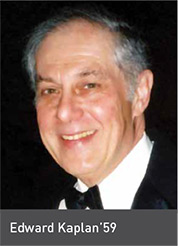 1959
1959
Edward S. Kaplan, a neurosurgeon and longtime member of the clinical faculty in the Department of Neurosurgery at the University of Tennessee in Memphis, died July 18, 2017. Dr. Kaplan trained at the Mayo Clinic in Rochester, Minn., and received a master of science degree from the University of Minnesota. In retirement he served as a volunteer neurosurgeon at Church Health in Memphis and pursued a longstanding passion for history. Baptist Hospital in Memphis, with which he was long affiliated, honored him with the Pillar Award of Distinction for excellence in patient care and service in the community. He is survived by his wife, Linda, two sons, Andrew Stone Kaplan’87 and Jeffrey Stone Kaplan’89, and four grandchildren.
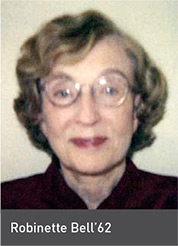 1962
1962
Robinette Bell, a former associate professor in the Department of Psychiatry at VP&S, died Aug. 17, 2017. She was 87. Following a five-year stint as a journalist with Look magazine, she shifted gears to study medicine. Dr. Bell specialized for many years in consult-liaison psychiatry, working with breast cancer patients, and long pursued a private practice in Manhattan. She moved with her second husband, Dr. Neil Redford, who survives her, to Denver, where she established a private practice and joined the clinical faculty in the Department of Psychiatry at the University of Colorado. In addition to her husband, she is survived by three children and seven grandchildren.
1963
David N. Reif-Snyder, a retired internist specializing in infectious diseases and travel medicine, died Dec. 27, 2017. He was 82. A native of Mexico, he grew up in Venezuela and Colombia before moving with his family to the United States. After serving in the U.S. Peace Corps, based in Bolivia, he was one of the founding faculty members of the University of South Florida medical school. He had a private practice in internal medicine for many years and served as chief of medicine at Bay Pines VA Hospital in Tampa. Survivors include his wife, Nelda, two daughters, two sons, 14 grandchildren, and many great-grandchildren.
Robert A. Schaefer, a distinguished gastroenterologist and associate professor of clinical medicine at Weill Cornell Medical Center, died Feb. 12, 2018. Dr. Schaefer served as lieutenant commander in the U.S. Navy from 1965 to 1967, earning a bronze star for service in Chu Lai, Vietnam, as a medical officer in the 9th Engineer Battalion of the First Marine Division. Also avid about music, he served as director of the Yale Broadcasting Company in college and remained a lifelong patron of classical music. He is survived by his wife, Mary Jeanne Kreek’62, a daughter, a son, and two grandchildren.
1965
Thomas S. Cottrell, a research pathologist, died Sept. 17, 2017. Dr. Cottrell served in the U.S. Navy aboard the USS Scanner, rising to the rank of lieutenant. He taught at the New York Medical College in Valhalla, N.Y., and later at SUNY Stony Book, where he served as executive associate dean and a member of the pathology faculty in its medical school, which he helped found. He was best known for his research on diseases of the lung. Survivors include his wife, Jane, two daughters, a son, and two grandchildren.
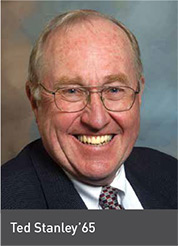 Theodore “Ted” Stanley, who spent 50 years at the University of Utah and earned acclaim as a medical entrepreneur, died July 13, 2017, in Salt Lake City. A remembrance posted by the University of Utah recalled that Dr. Stanley, a surgeon and anesthesiologist, first hoped for a career in baseball. After unsuccessfully trying out for the Brooklyn Dodgers and deciding he couldn’t make a living as a musician (he could play nine instruments by the time he finished high school), he settled on a career in medicine. He graduated from Columbia College with majors in zoology, chemistry, and music. After medical school and a few years of training at Michigan, he arranged to train at the Cleveland Clinic with Willem Kolff, one of the pioneers in artificial organs. When Dr. Kolff unexpectedly resigned from the Cleveland Clinic, Dr. Stanley followed Dr. Kolff to the University of Utah. Initially planning to become a heart surgeon, he decided in Utah to add a specialty in anesthesiology. That brought him back to Columbia for two years of residency, followed by two years of service in the Air Force at Lackland Air Force Base in San Antonio. Back in Utah, his faculty appointments in surgery and anesthesiology put him on the team that performed the first total artificial heart transplant on Barney Clark in 1982. Dr. Stanley’s acclaim as an entrepreneur includes his role in bringing the “fentanyl” family of opioids into medical practice. He may be best known for Actiq, a lollipop that provides a fast-acting, convenient, non-invasive opioid delivery system for pain management. Dr. Stanley and a colleague invented the lollipop, which was approved by federal regulators to treat cancer pain. The lollipop also has been used to relieve migraine and cluster headaches, severe back and bone pain, and chronic conditions. Actiq’s commercial success provided a royalty stream to the University of Utah and the Department of Anesthesiology that resulted in an endowment to support research and education and the creation of several endowed chairs. He founded several biotech companies and mentored engineers and doctors pursuing interests in research and medical devices. In 2008, Dr. Stanley was one of two recipients of the Hall of Fame awards given by the Utah Technology Council, which dubbed Dr. Stanley a “serial entrepreneur” for founding or co-founding eight life science companies and three research and educational foundations. He also was an avid train lover and enjoyed photographing wildlife at his mountain ranch, the annual gathering place for an elk hunt he hosted for 41 years. He is survived by his wife, Susan, three sons, a daughter, a brother, and three grandchildren.
Theodore “Ted” Stanley, who spent 50 years at the University of Utah and earned acclaim as a medical entrepreneur, died July 13, 2017, in Salt Lake City. A remembrance posted by the University of Utah recalled that Dr. Stanley, a surgeon and anesthesiologist, first hoped for a career in baseball. After unsuccessfully trying out for the Brooklyn Dodgers and deciding he couldn’t make a living as a musician (he could play nine instruments by the time he finished high school), he settled on a career in medicine. He graduated from Columbia College with majors in zoology, chemistry, and music. After medical school and a few years of training at Michigan, he arranged to train at the Cleveland Clinic with Willem Kolff, one of the pioneers in artificial organs. When Dr. Kolff unexpectedly resigned from the Cleveland Clinic, Dr. Stanley followed Dr. Kolff to the University of Utah. Initially planning to become a heart surgeon, he decided in Utah to add a specialty in anesthesiology. That brought him back to Columbia for two years of residency, followed by two years of service in the Air Force at Lackland Air Force Base in San Antonio. Back in Utah, his faculty appointments in surgery and anesthesiology put him on the team that performed the first total artificial heart transplant on Barney Clark in 1982. Dr. Stanley’s acclaim as an entrepreneur includes his role in bringing the “fentanyl” family of opioids into medical practice. He may be best known for Actiq, a lollipop that provides a fast-acting, convenient, non-invasive opioid delivery system for pain management. Dr. Stanley and a colleague invented the lollipop, which was approved by federal regulators to treat cancer pain. The lollipop also has been used to relieve migraine and cluster headaches, severe back and bone pain, and chronic conditions. Actiq’s commercial success provided a royalty stream to the University of Utah and the Department of Anesthesiology that resulted in an endowment to support research and education and the creation of several endowed chairs. He founded several biotech companies and mentored engineers and doctors pursuing interests in research and medical devices. In 2008, Dr. Stanley was one of two recipients of the Hall of Fame awards given by the Utah Technology Council, which dubbed Dr. Stanley a “serial entrepreneur” for founding or co-founding eight life science companies and three research and educational foundations. He also was an avid train lover and enjoyed photographing wildlife at his mountain ranch, the annual gathering place for an elk hunt he hosted for 41 years. He is survived by his wife, Susan, three sons, a daughter, a brother, and three grandchildren.
1965 PSY
Ronald R. Fieve, a psychiatrist who pioneered the use of lithium to treat mood disorders, died Jan. 2, 2018, of congestive heart failure. Professor of clinical psychiatry at VP&S, he was a founder of the Foundation for Mood Disorders in New York. According to a tribute in the New York Times, Dr. Fieve, along with colleague Ralph N. Wharton’57, “identified lithium as the first naturally occurring medication to prevent and control a specific psychiatric disorder.” He was the author of several highly regarded books, including “Moodswing: The Third Revolution in Psychiatry,” “Prozac: Questions and Answers for Patients, Family and Physicians,” and “Bipolar Breakdowns.” In the latter text, his pioneering work, he wrote: “While many psychiatrists and psychoanalysts held on to Freud’s psychoanalytic explanation of the major mood swings, there was compelling evidence to the contrary. The medical model, with an emphasis on heredity and brain chemistry, began to replace Freud, and the age of psychopharmacology was born.” Dr. Fieve is survived by his wife, Katia von Saxe, two daughters, and four grandchildren.
1967
Daniel Garnett, a retired general surgeon, died Nov. 1, 2017. Dr. Garnett was proud of his service in the U.S. Navy, attached to a Marine battalion during the Vietnam War. In addition to his longstanding private practice, he served as chief of staff of Swedish Hospital Medical Center in Seattle. He is survived by his wife, Stephanie, two sons, and five grandchildren.
1970
Psychiatrist Diane Lipson Stone died in October 2017. A member of the clinical psychiatry faculty at New York University, Dr. Stone pursued a private psychiatric practice in New York. She is survived by a daughter.
1972
David L. Curtis, a rheumatologist in private practice in San Francisco, died July 28, 2017, of acute leukemia. Dr. Curtis was a member of the clinical faculty at the University of California at San Francisco. In his free time he enjoyed skiing, tennis, biking, and hiking. He is survived by his wife, Nora, a daughter, two sons, and four grandchildren.
1975
Jules N. Manger, an internist in private practice and one of the founding members of Concord Emergency Medical Associates in Concord, N.H., died July 25, 2017. He served in the U.S. Army in Vietnam, where he was wounded in combat and honorably discharged, winning a Purple Heart. An adjunct faculty member at Dartmouth Medical School, he served for three decades as an emergency room specialist at Concord Hospital. Dr. Manger was a supporter of Disabled American Veterans. Preceded in death by his wife, Janis, he is survived by a daughter, a son, and six grandchildren.
1977
Jonathan Greenberg, a neurosurgeon who also earned a law degree from Columbia, died Jan. 1, 2018. Professor and chair of neurosurgery at the University of Miami medical school, Dr. Greenberg served as chief of the neurotrauma service at Jackson Memorial Hospital. He was the author of a textbook, “The Handbook of Head and Spine Trauma.” Dr. Greenberg is survived by his wife, Dr. Myriam P. Garzon, four daughters, and a son.
1984
Hematologist Kevin T. McDonagh died of cancer Dec. 23, 2017. He served as chief of hematology, oncology, and bone marrow at the Markey Cancer Center of the University of Kentucky before moving to Vanderbilt University to head programs in benign hematology and multiple myeloma. He is survived by his wife, Dr. Leslie Crofford.
1989
Tragedy struck Mark Montgomery, who was among those killed Jan. 9, 2018, in California’s mudslides. Dr. Montgomery, a specialist in hand and upper extremity surgery in group practice, was affiliated with the Santa Barbara Cottage Hospital. His daughter, Caroline, was also among the victims of the mudslides. An online tribute at the Orthopedics This Week website said he played rugby at VP&S after wrestling as an undergrad at Princeton. He completed an orthopedic residency at NewYork-Presbyterian/Columbia and a fellowship in hand and upper extremity surgery at Brigham and Women’s Hospital. He is survived by his wife, Catherine, a daughter, and a son.
OTHER ALUMNI DEATHS
T. Berry Brazelton’43
John Gerster’44
Richard Rudders’63
- Log in to post comments

